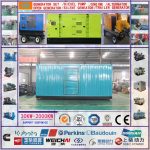Introduction
In remote areas or on isolated islands, ensuring a reliable and continuous power supply can be a significant challenge. In such locations, where grid connectivity is limited or unreliable, diesel generators play a crucial role in providing power for essential services and infrastructure. One of the key applications of diesel generators in these scenarios is islanding operation, where the generator operates independently of the main grid to provide power to a local network. This article will explore the concept of islanding operation, the role of diesel generators in this mode of operation, the key considerations for successful islanding, and the advantages and challenges associated with using diesel generators for islanding operation.
Understanding Islanding Operation
Islanding operation refers to the ability of a power generation system, such as a diesel generator, to operate independently of the main grid in a localized area. In islanding mode, the generator supplies power to a specific load or network without being synchronized with the utility grid. This mode of operation is commonly used in remote locations, islands, or in situations where grid connectivity is unreliable or unavailable.
Diesel Generators for Islanding Operation
Diesel generators are well-suited for islanding operation due to their reliability, fuel efficiency, and robust performance characteristics. Diesel generators consist of a diesel engine that drives an alternator to generate electricity. These generators can provide a stable and consistent power supply, making them ideal for islanding applications where grid stability may be a concern.
Key Considerations for Successful Islanding Operation
Several factors need to be considered to ensure successful islanding operation with diesel generators:
1. Load Management: Proper load management is essential to avoid overloading the generator and to ensure a stable power supply. Balancing the load and monitoring the power demand are critical aspects of islanding operation.
2. Control System: A reliable control system is necessary to manage the generator's operation in islanding mode. The control system should be able to detect grid failures, initiate islanding operation, and control the generator's output to match the load demand.
3. Protection Mechanisms: Diesel generators operating in islanding mode should be equipped with protection mechanisms to prevent damage from overloading, overvoltage, or other electrical faults. Automatic shutdown features can help safeguard the generator and connected equipment.
4. Fuel Supply: Maintaining a reliable fuel supply is crucial for uninterrupted operation of diesel generators in islanding mode. Adequate fuel storage capacity and regular fuel monitoring are essential to ensure continuous operation.
5. Maintenance and Monitoring: Regular maintenance and monitoring of the generator system are necessary to identify potential issues and prevent unexpected failures. Scheduled inspections, testing, and maintenance activities should be carried out to keep the generator in optimal condition.
Advantages of Diesel Generators for Islanding Operation
Using diesel generators for islanding operation offers several advantages:
1. Reliability: Diesel generators are known for their reliability and durability, making them a dependable power source for islanding applications.
2. https://www.lkpowerplant.com/160kw-400kw/ : Diesel generators are more fuel-efficient compared to other types of generators, providing cost savings in the long run.
3. Quick Start-Up: Diesel generators can start up quickly and reach full load capacity within a short period, ensuring a rapid response to power demand fluctuations.
4. Versatility: Diesel generators can be easily integrated into existing power systems and customized to meet specific requirements, making them versatile for a wide range of applications.
Challenges of Using Diesel Generators for Islanding Operation

Despite their advantages, diesel generators for islanding operation also present some challenges:
1. Environmental Impact: Diesel generators emit greenhouse gases and pollutants during operation, contributing to air pollution and environmental degradation. Implementing emission control measures and using cleaner fuels can help mitigate these impacts.
2. Fuel Storage and Supply: Maintaining a consistent fuel supply for diesel generators in remote locations can be challenging, especially in areas with limited access to fuel resources. Proper fuel management and logistics are essential to avoid interruptions in power supply.
3. Operation and Maintenance Costs: Diesel generators require regular maintenance and servicing to ensure optimal performance, which can add to the overall operational costs. Proper maintenance practices and monitoring can help reduce these costs over the generator's lifespan.
Conclusion
Diesel generators play a critical role in islanding operation, providing a reliable and efficient power source for remote locations and isolated islands. By understanding the key considerations, advantages, and challenges associated with using diesel generators for islanding operation, stakeholders can make informed decisions when implementing power systems in off-grid or unreliable grid environments. With proper planning, maintenance, and operation, diesel generators can ensure a stable and continuous power supply, contributing to the sustainable development of isolated communities and infrastructure.
